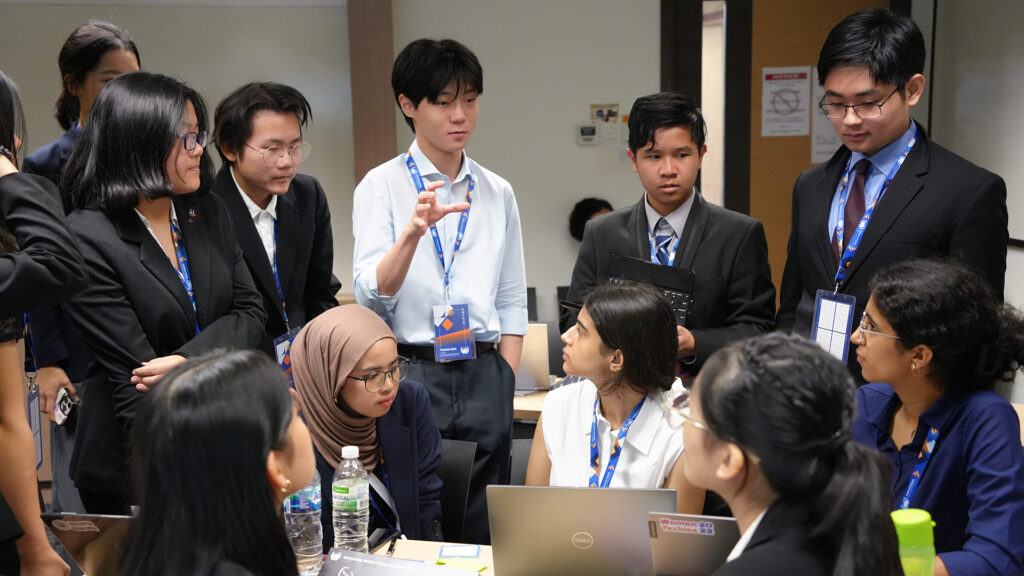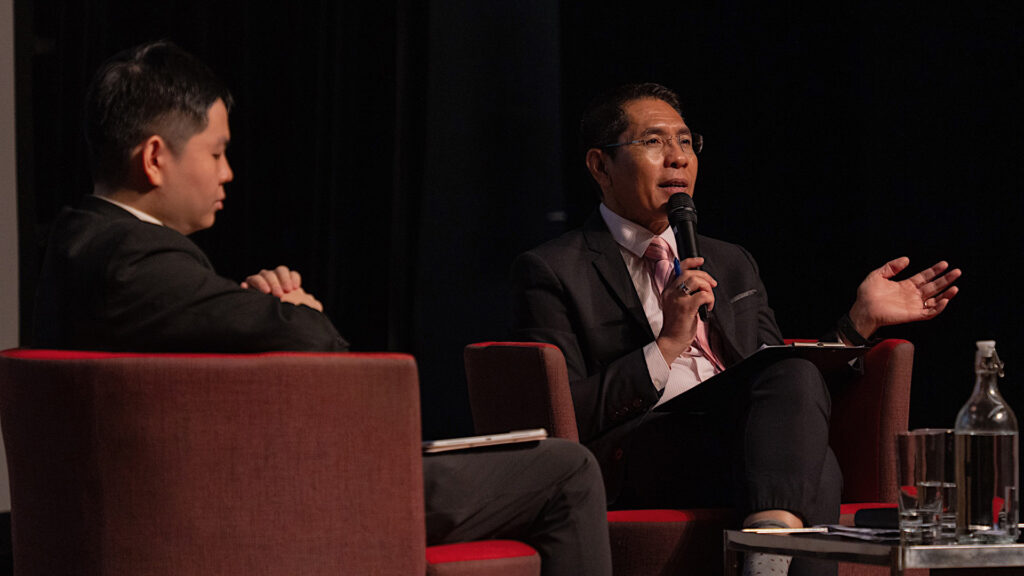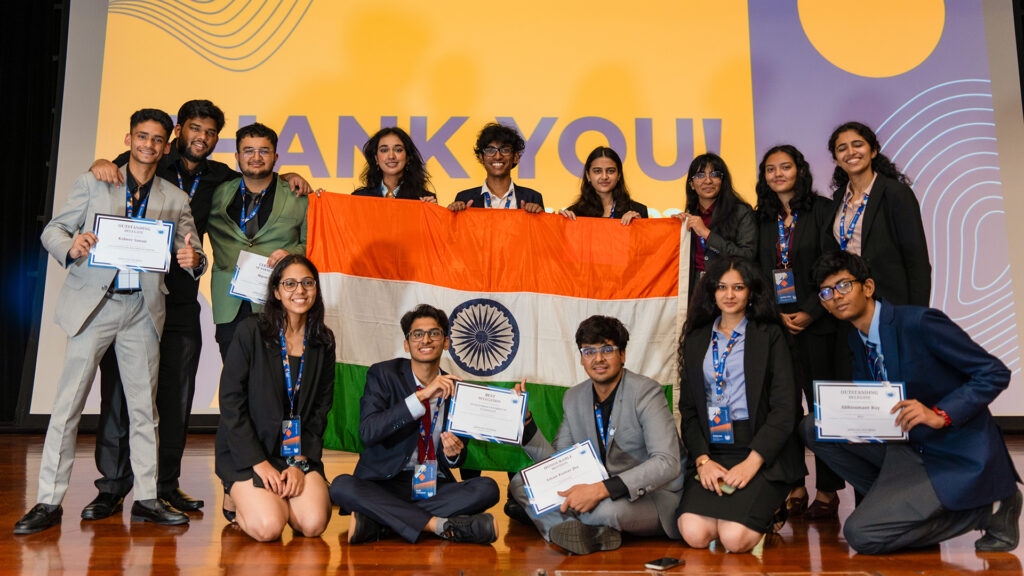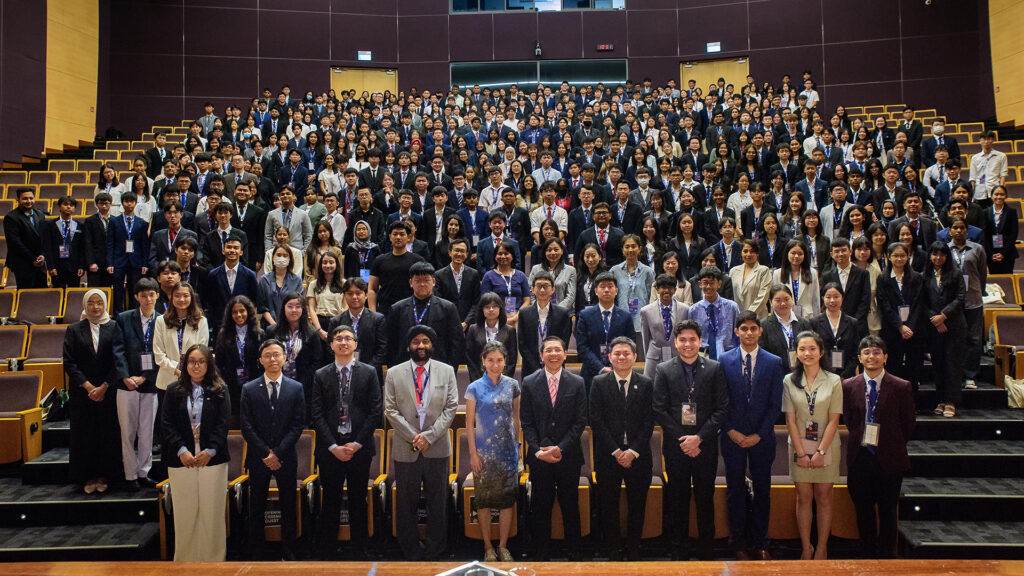Students Take on Global Challenges at the 21st Singapore Model United Nations
July 5, 2024
IN BRIEF | 10 min read
- SMUN participants roleplayed as UN delegates in councils to address urgent geopolitical issues such as managing the impact of climate change on small island developing states and combating cyber terrorism in international relations.

More than 500 students from over 20 secondary schools, pre-university, and tertiary institutions across Singapore and the Asia-Pacific region gathered at the 21st Singapore Model United Nations (SMUN) conference that was organised by the NUS Political Science Society (PSSOC). Held from 4 to 7 June at NUS University Town, the event provided a forum for robust debate on critical global issues such as healthcare, climate change, and peacekeeping efforts, and witnessed the highest participation in the event’s history.
Organised since 2003, SMUN is a flagship event of PSSOC. It has earned a reputation for being one of the eminent Model UN conferences in the Asia-Pacific region and offers a distinguished platform of discourse for youths from all walks of life to get a taste of international diplomacy through simulations of UN committees.
This year’s theme, “Reshaping the World Order: Challenges and Opportunities”, provided an opportunity for participants to navigate the complexities of rapidly evolving global geopolitics. Participants stepped into the roles of geopolitical actors, including UN delegates and members of international bodies like the United Nations Security Council, the African Union, and the World Health Assembly, to engage in meaningful negotiations and debates about pertinent issues.
At the conference, Dr Mohamad Maliki Osman, Minister in the Prime Minister’s Office, and Second Minister for Education and Foreign Affairs, delivered a keynote speech which addressed the intricate dynamics of the global landscape amidst growing global geopolitical tensions. Referencing Singapore Prime Minister Lawrence Wong’s recent inauguration speech, he emphasised the challenges posed by global conflicts and the need for Singapore to navigate these with a strategic and principled approach, and maintaining healthy relations with like-minded partners as we pursue our national interests.
“Ultimately, we hope to maintain good relations with all countries, while safeguarding our national interest in building an open and inclusive Southeast Asia…Singapore’s foreign policy is driven by our own principles and national interests.”

Dr Maliki concluded his speech by urging the youth to leverage platforms like SMUN to become proactive architects of a brighter future, not only for Singapore but for the global community.
An opportunity to learn about diplomacy and international relations
SMUN simulates United Nations committee sessions in which participants roleplay as UN delegates in councils to address urgent geopolitical issues through extensive research, the preparation of position papers, and the development of policy proposals. Their collaborative efforts lead to intense debates and voting on draft resolutions, with the goal of passing these resolutions with a majority vote. This year, delegates formed 11 councils to address 21 topics of interest such as managing the impact of climate change on small island developing states, combating cyber terrorism in international relations, and addressing global supply chain vulnerabilities.

Significant discussions at the SMUN 2024 conference included a focused session on the integration of artificial intelligence (AI) in healthcare. Delegates debated regulatory strategies to ensure AI is used ethically across global healthcare frameworks. Key concerns included safeguarding data privacy, ensuring equitable access to AI-driven healthcare, and the need for international standards to manage AI implementation without exacerbating healthcare disparities.
Another key discussion was led by the BRICS+ council on the de-dollarisation of the global economy. Representing the interests of countries such as Brazil, Russia, India, China, South Africa and more, the BRICS group focuses on economic cooperation and policy coordination among its member nations to enhance their influence in global affairs. This session explored the introduction of a common currency among BRICS+ nations to reduce dependence on the US Dollar. The debate addressed economic stability, potential geopolitical implications, and the strategic steps required for a transition towards a new currency system, emphasising the need for a coordinated approach to mitigate economic risks.
As the conference was designed to spur participation and dialogue, participants who made significant contributions were recognised with awards, such as Award for Best Delegate, Outstanding Delegate, Honourable Mentions, and Best Position Paper. The delegation from the Netaji Subhas University of Technology received the Best School Delegation award, highlighting their outstanding preparation and debate performance.
Mr Aman Kumar Jha, a member of the winning delegation said, “Coming to participate in SMUN all the way from India was an indelible experience. From delving into an eclectic mix of pressing global challenges to learning diplomacy and sharing perspectives, the four days of rigorous debating gave us a glimpse of what it is like at the UN. The treasure trove of memories that we made along the way made SMUN even more special for us. Congratulations to the Secretariat and PSSOC for organising such a great event!”

PSSOC President and Year 3 Faculty of Arts and Social Sciences (FASS) Political Science student Ethan Naidu said, “PSSOC extends its gratitude to Dr Maliki Osman, all participating institutions, and the organising committee for their roles in making SMUN 2024 a success. This year’s conference not only enriched the understanding of international relations among participants but also honed their skills in diplomacy and global policy formulation. Through engaging discussions and collaborative problem-solving, SMUN 2024 equipped a new generation of leaders to effectively address future global challenges.”

This story first appeared in NUSNews on 5 July 2024.

